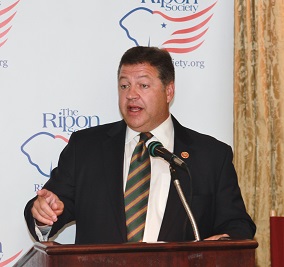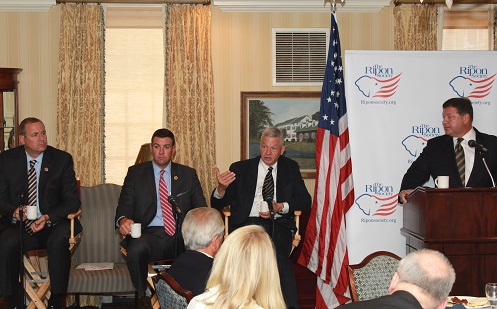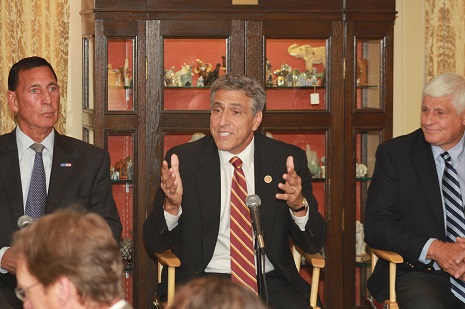Chairman Shuster & Six Subcommittee Chairmen Lead Charge to Modernize America’s Aging Transportation System

WASHINGTON, DC – The Ripon Society hosted a breakfast discussion yesterday morning with the leaders of the House Committee on Transportation and Infrastructure, who talked about the road ahead in transportation policy and why it is so important for Congress and the President to reach agreement on a long-term plan to modernize the crumbling roads and aging infrastructure in the United States.
Participating in the breakfast was Committee Chairman Bill Shuster (PA-9). He was joined by the Chairmen of his six subcommittees, including: Tom Petri (WI-6), who chairs the Highways and Transit Subcommittee; Frank LoBiondo (NJ-2), who heads up the Subcommittee on Aviation; Duncan Hunter (CA-50), who leads the Subcommittee on Coast Guard and Maritime Transportation; Lou Barletta (PA-11), who chairs the Subcommittee on Economic Development, Public Buildings and Emergency Management; Jeff Denham (CA-10), the leader of the Subcommittee on Railroads, Pipelines, and Hazardous Materials; and Bob Gibbs (OH-7), who heads up the Subcommittee on Water Resources and Environment.
Shuster kicked off the discussion by talking about Tuesday’s passage by the House of legislation that would extend transportation funding and keep the Highway Trust Fund solvent for one year. According to Shuster, the extension is critically needed, but it comes up far short of the “long-term fix” that he and his subcommittee chairmen want to do.
“People said we’ve had a great week,” the Pennsylvania lawmaker stated. “I don’t know if we had a great week. It was an okay week. We did the patch. I don’t think that’s really what any of us wanted to do. We would really rather figure out the funding and have a long-term, multi-year bill. But it was a decent week to be able to stop the crisis from occurring with the trust fund running out of money. And I believe the strategy was right to get us through to next year. That still doesn’t take the pressure off. The pressure is still there to find a long-term fix for the trust fund. What it looks like, I don’t know. I don’t want to predict. But it has to be done. We’ve got to make the investments we need for our infrastructure. Our highways and bridges all over this country are going to suffer. And people will suffer because that will cost jobs.”
Petri echoed Shuster’s remarks, and stressed that it was critical for Members to be open to a wide range of solutions in meeting the nation’s highway funding needs.
“One of the things that is important as we go forward with the highway bill is to remember that all options are on the table,” he stated. “The 18.4 cent gas tax hasn’t been changed since 1993. The average driver in America drives about 11,000 annually and gets an average of 21 miles a gallon, which means they paid $97.50 a year for our nation’s highways. That’s less than $10 a month. If this was changed by 10.6 cents in the federal gas tax, it would be an extra $4.66 a month. That’s the reality of what we are talking about. If we come up with a new source of revenue, great — and they do exist. But we have a big challenge here. And if we keep all the options on the table, I think we’ll end up eventually making the right decision.”
LoBiondo agreed with Petri about the urgency of the issue and said finding a solution is long overdue.
“I have some numbers burned into my brain that I don’t like,” he said. “I remember them constantly because of the negative consequences. They are 22, seven and two – 22 extensions over seven years, with a two-week shutdown. That’s unacceptable.” The New Jersey Republican then turned his attention to the jurisdiction of his subcommittee and the need to pass a Federal Aviation Administration Reauthorization bill in 2015.

“The idea is to get to a product early next year that can pass the House,” he stated. “Of course, figuring out what the Senate is going to do is always a challenge. But I am pretty optimistic that we are going to have something for everybody to look at. It’s going to be a good bill. There’s tremendous economic opportunity — besides the economic risk if we don’t do good things. But there is a tremendous economic opportunity. That’s what we are going to focus on as we try to incorporate all the ideas from the great stakeholders that we have. I’m looking forward to a great year next year.”
Hunter expressed similar optimism about his subcommittee, and explained why protecting America’s maritime industrial capacity will be one of his panel’s top legislative priorities in the coming years.
“To be able to offset the lack of Navy shipbuilding with Jones Act shipbuilding and Coast Guard shipbuilding, that’s what keeps our shipbuilders going,” Hunter stated. “A few years ago, Great Britain could not make an aircraft carrier. They had to hire South Korea. That’s incredible for a nation that ruled the oceans for hundreds of years. We don’t want to get there. On the Coast Guard Maritime Subcommittee, we are protectionist. We believe there are some things worth protecting. One of those things is shipbuilding.”
Barletta also struck a protectionist chord in his remarks – not about shipbuilding, but about public buildings and the need to protect American tax dollars that are being wasted on unnecessary federal space.
“I tried to find ways that we could actually get something done for the taxpayers,” Barletta stated in explaining his agenda. “So I began looking at public buildings. I toured one courthouse, and for every federal employee there was 1,200 square feet of space. I couldn’t find anybody – I thought it was a federal holiday. It was ridiculous. And I began realizing that this is happening all over the country. So I got together with the administrator at GSA. Working together, as leases expired over the past year, we began moving agencies into a smaller space. And in one year of doing that, we have saved taxpayers over $2 billion — just by moving federal agencies into smaller buildings. So I’m really excited about that.”
Denham sounded an equally upbeat note about his subcommittee, and expressed hope that bipartisan agreement can be reached on the Passenger Rail Reauthorization act in the coming year.
“We’re coming together between the two parties,” he stated, in describing the bill. “It’s going to create efficiencies. It’s going to create greater transparency. We’re going to be able to build some things along the Northeast corridor, and we’re allowing the Northeast corridor to actually keep its profits. When you’re doing things well in this country, you ought to be able to improve your infrastructure in the process. I’ll tell you another reason I think this bill will get bipartisan support — pets on trains. You heard it here first. In the Northeast corridor especially, many people would like to bring their pets on the train. This is something Democrats love, and it’s a great idea.”
Gibbs focused his remarks on the Water Resources Development Act (WRDA), which originated in his subcommittee and was signed into law by the President last month.
“There are pundits out there who said we could never do a WRDA bill because of the moratorium on earmarks,” he observed. “Previous WRDA bills were loaded with earmarks. This WRDA bill has zero earmarks. We came up with a mechanism that keeps our authority – we don’t defer to the executive branch – and it’s more transparent and accountable. It does what we need to do in this country to keep our competitive edge, and gets these Army Corps of Engineers projects done. Also in the WRDA bill we de-authorize projects that don’t need to be there to save some money. The thing that really gets me about the Army Corps stuff is that it takes up to 15 years or longer sometimes to get the studies done before you can start the project. That’s just totally unacceptable. In the private sector, I doubt there’s anyone who takes 15 years to decide to do something.”

Gibbs also talked about overreach by the Environmental Protection Agency and the need to rein the agency in.
“We’re for common-sense reforms at the EPA – or as I sometimes call it, the ‘Elimination Productivity Agency,’” the Ohio lawmaker stated. “We need common sense reforms. A growing vibrant economy provides the resources to protect the environment. Economies that are struggling don’t provide resources. You look at third world countries, you look at my hog operation – for years we weren’t making money in the hog business; we focused on trying to stay in business. The years we were making some money we could do things out on the farm that would enhance the environment. I think it goes hand in hand. A growing, strong and vibrant economy helps and enhances the protection of the environment — both on the air side and the water side — because everyone wants clean air and clean water.”
The discussion concluded with the leaders of the Transportation Committee taking questions, including one to Chairman Shuster about the challenges facing the FAA reauthorization bill and why it is so important to move forward with the measure in the coming year.
“It’s going to be a difficult process,” Chairman Shuster conceded. “But I really believe if we want aviation to not turn out like shipbuilding in this country — or textiles, or electronics, or autos, or steel — we need to do something proactively now to change the playing field and keep a viable manufacturing industry for aviation. It has already started to happen. The airline industry used to control 60% of the world market. It’s now 27-28%. The decline is there. If we keep piling taxes and regulations onto this industry, it will go the way everything else has gone in America.”
To view the complete remarks of Chairman Shuster and his six Subcommittee Chairmen before The Ripon Society’s breakfast discussion yesterday morning, please click on the link below:
The Ripon Society is a public policy organization that was founded in 1962 and takes its name from the town where the Republican Party was born in 1854 – Ripon, Wisconsin. One of the main goals of The Ripon Society is to promote the ideas and principles that have made America great and contributed to the GOP’s success. These ideas include keeping our nation secure, keeping taxes low and having a federal government that is smaller, smarter and more accountable to the people.



